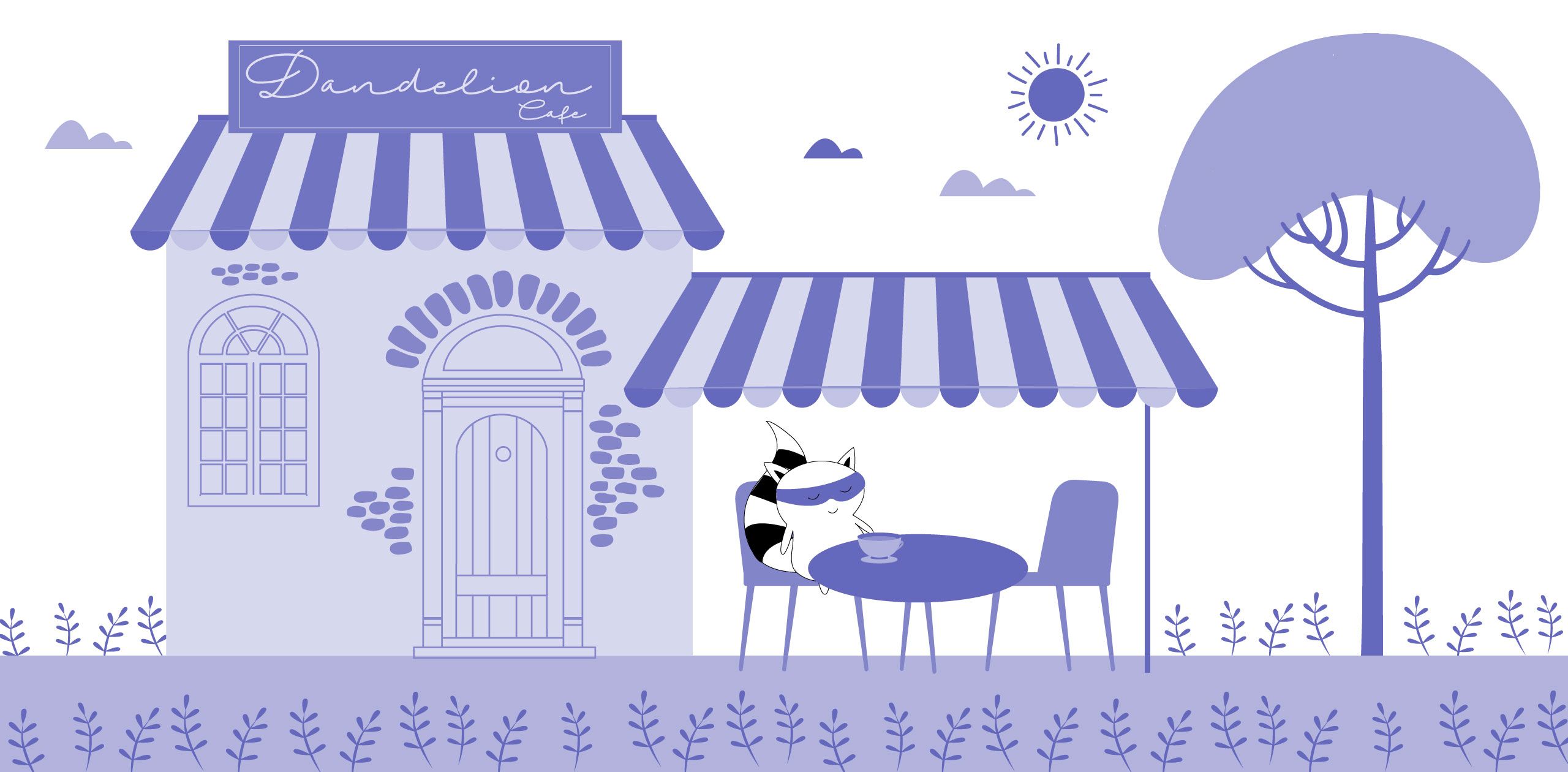
Homophones are words that sound the same but have different meanings, and the French language is full of them. Have you heard the famous phrase: “Le ver vert va vers le verre vert” – “The green worm goes to the green glass?” This is just one example that shows the extent of how many homophones exist in French.
Homophones can cause the most problems for English speakers learning French, as it can be challenging to understand the spoken language or write certain words correctly. So, to make your life a bit easier, here’s a list of the most common French homophones.
Check out the words below, learn the difference between “au,” ”aux” and “eau,” and boost your language skills. With this knowledge of the common French homophones, listening comprehension should be much easier in the future. Read on!
Learn French with Langster
Au / Aux / L’eau
This is one of the famous French homophones examples. All three words are pronounced in a similar way: as a closed French "o" (like "o" in English "cold.") And yes, as you can see, none of them have a letter "o".
Unlike some other homonyms, because these show up in very different contexts, they are not too difficult to distinguish in spoken French, especially after a short practice.
Both au and aux are contractions that you get from combining the preposition à with either le or les.
- Au is used when talking about a location, for example:
French
English
Il est au magasin.
He is at the store.
- Aux is used when talking about a location in plural:
French
English
Ils sont aux États-Unis.
They are in the United States.
Eau, in turn, simply means "water," as in:
French
English
Il y a de l'eau dans le réservoir.
There is water in the tank.
Here, you don't even need to think about the context too much. If a friend asks you for "un verre d'eau" and invites you to "aller au magasin" together, it's crystal clear that in the first part, he wants some water, and in the second, he is planning to go to the store.
Un verre / Vert / Un ver / Vers / Un vers
All five words are written differently, all have very different meanings but are pretty understandable in context. However, when put into a tongue-twister like the one we mentioned in the introduction, they can pose a threat even for native speakers. Let's see what they mean:
- Un verre – "a glass" (of water, wine, etc.) You can ask for it in a café by saying:
French
English
Je voudrais un café et un verre d'eau, s'il vous plait.
I would like a coffee and a glass of water, please.
- Vert – "green" (the color). It also becomes verte (pronounced as [vert] in its feminine form. Remember this word to describe clothes, fruits, or even animals. For example, a worm, which is:
- Un ver – "a worm." This homonym is not used as commonly as the other ones in spoken French but it still might pop up from time to time. For example:
French
English
J'ai vu un ver de terre vert dans mon jardin.
I saw a green earthworm in my garden.
The last two, vers and un vers, have the same spelling, which can make them a bit harder to distinguish from each other, but these are actually different parts of speech.
- Vers – "toward." This is a common French preposition that is quite easy to understand in a sentence. It’s used together with a noun, as in the phrase:
French
English
Vers la maison.
Near the house.
Even if you’re a complete beginner but know a bit about the French sentence structure, this one is the easiest to understand: after all, saying “worm a house” or “green a house” would be complete gibberish.
- And, finally, the noun vers – “a verse, a line” (relating to the poetry). This one is also rarely used, but you can hear it in sentences like:
French
English
Quel est votre vers préféré de Shakespeare ?
What is your favorite line from Shakespeare?
La paie / La paix / Le pet
This group is probably a bit harder to master since all of them are nouns and they all sound alike. However, if you practice reading French in context, it will become much easier to know which one is used when. Let's see:
- La paie – "the salary" (or "the paycheck.") You would use this in a sentence like:
French
English
Je vais toucher ma paie après le travail.
I'm going to get my paycheck after work.
- La paix – "the peace." As in:
French
English
La paix est importante pour tout le monde.
Peace is important to everyone.
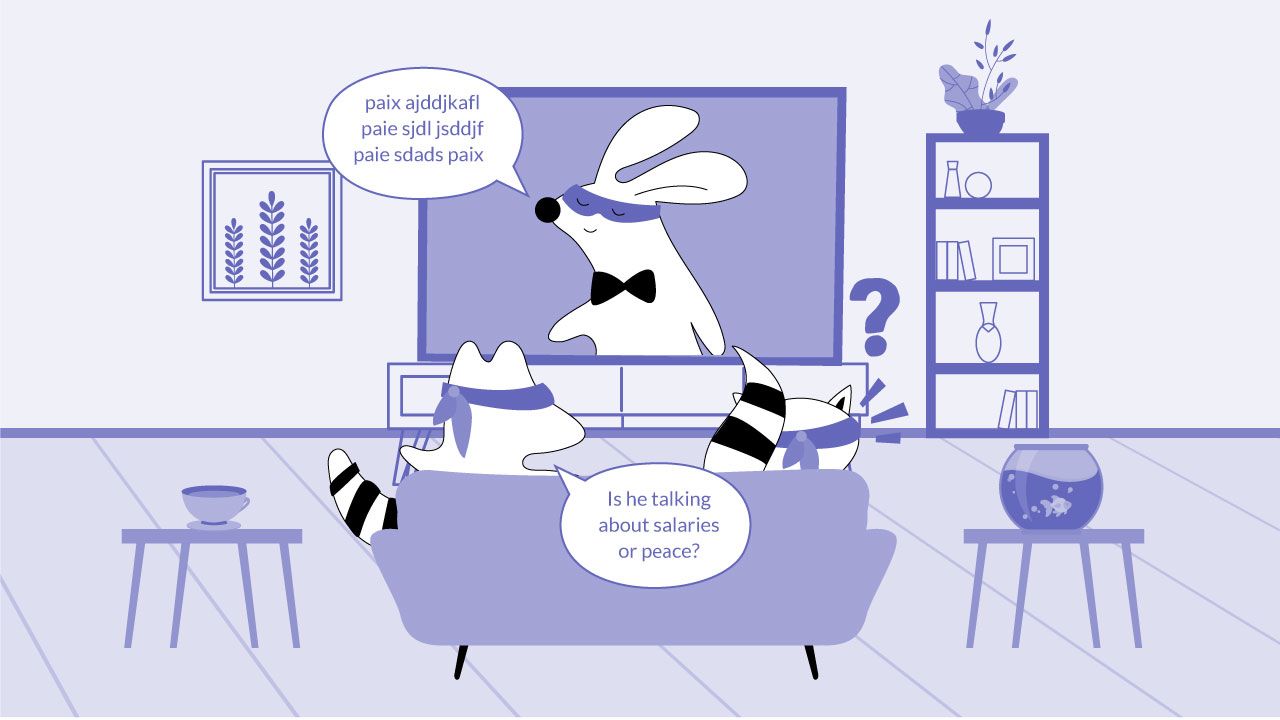
- And, finally, le pet – "fart.” This is an informal word, but probably the easiest to distinguish among the three of them. After all, we might hear a politician talk about salaries or the world piece, but farts? The French are a bit too polite for that.
Air / L'air / Une aire / Une ère
These French nouns share the same sound (pronounced as the French letter /r/), and sometimes even the spelling (as in air and l’air). This can make your language learning journey pretty complicated, so let’s deal with them one word at a time:
- Air is a French word that can be generally translated as “appearance.” We use it in constructions such as:
French
English
Il a l'air malade.
He looks sick.
- L’air, on the other hand, simply means “air” – just like in the English language. Here’s that in a sentence:
French
English
L'air est pollué.
The air is polluted.
- If you want to say "an area" or "a space," the word you are looking for is une aire:
French
English
C'est une grande aire de jeux pour les enfants.
It's a big playground for children.
- And the last one, which looks very similar to the English word, is une ère – "an era." You can use it in a sentence like:
French
English
Nous entrons dans la nouvelle ère de la technologie.
We are entering the new era of technology.
Cent / Sang / Sens / Sans
These four French words might give you a headache if you are just starting to learn the language. They all sound very similar, and even though their contexts can differ a lot, it can still be challenging to distinguish them in audio recordings. Moreover, all of these words are quite common, which adds to the difficulty.
- Cent – "one hundred." You will hear it most often when counting something, paying, or reading dates:
French
English
Combien coûte ce livre ? – Il coûte cent euros.
How much does this book cost? – It costs 100 euros.
- Sang – "blood." This is a simple noun that you would use in a sentence like:
French
English
Il y avait du sang sur sa chemise.
There was blood on his shirt.
- Sens – "meaning." As in:
French
English
Je ne comprends pas le sens de ce mot.
I don't understand the meaning of this word.
However, the same spelling is used for the first-person conjugation of the word sentir (to feel): sens.
French
English
Je sens que quelque chose ne va pas chez toi.
I feel that something is wrong with you.
- Sans – "without." This is a simple but very common preposition.
French
English
Sans toi, je ne suis rien.
Without you, I am nothing.
While these words might be hard to remember at first, remember that they are all different parts of speech. Noting that cent is a number, sang is a noun, sens can be a noun and a verb, and sans is a preposition can be a lifesaver in certain situations.
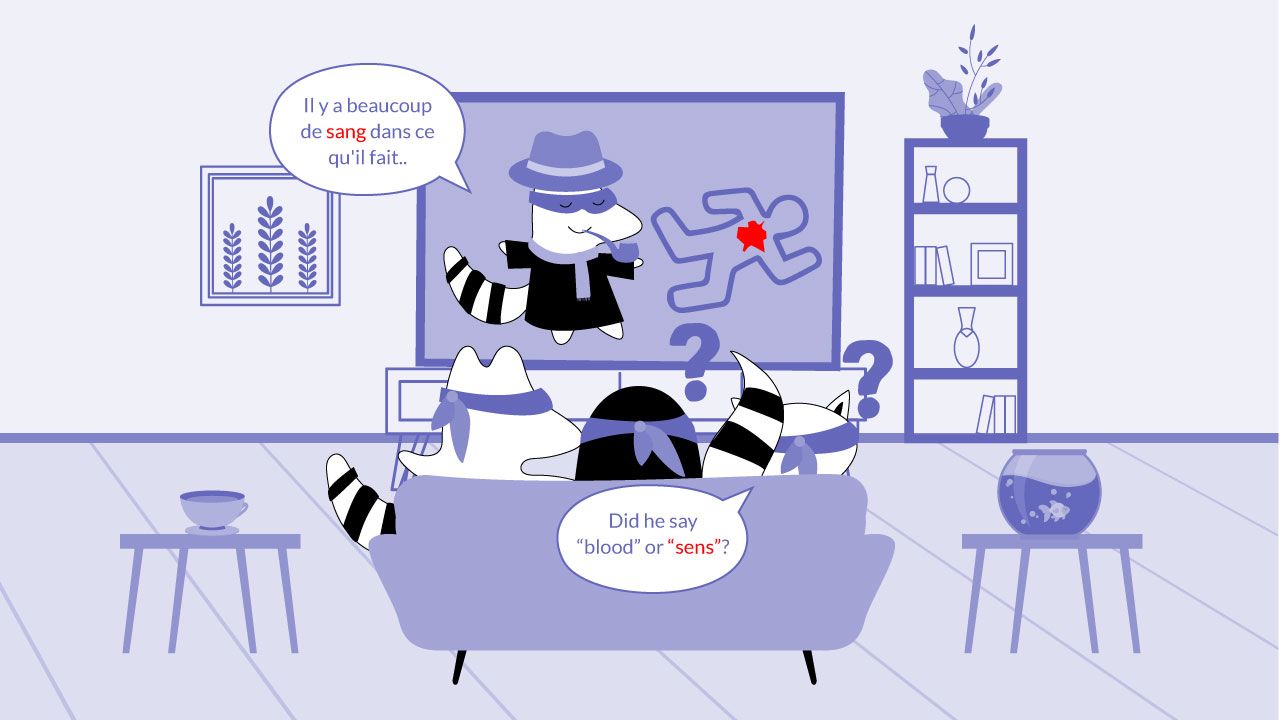
La foi / Le foie / Une fois
Just like other homonyms, foi, le foie, and une fois sound exactly the same when pronounced. All three are nouns, but their meanings are very different from each other. When used in context, they should be pretty easy to understand.
- La foi – "faith." You would use this word in a sentence like:
French
English
J'ai la foi en toi.
I have faith in you.
…or when visiting a church.
- Le foie – "liver." You might hear this when visiting a doctor’s office or talking about someone’s health. Here’s a sample sentence:
French
English
Mon foie est malade.
I have a sick liver.
- Une fois – "once” or “one time.” This is the most common word from this group that you might hear in many different contexts. For example:
French
English
Si tu le fais une fois, tu peux le faire deux fois.
If you do it once, you can do it twice.
Une fois que tu auras terminé tes devoirs, tu pourras aller jouer dehors.
Once you finish your homework, you can go play outside.
Leur / Leurre / L’heure
These three words might give you a little trouble at first, but with some practice, it should be easy to distinguish them in context. All three of them are used in different contexts as well as different constructions.
- Leur is a third-person plural pronoun that can mean "theirs" or "them." Here’s how you can use it:
French
English
Ces livres sont leurs.
These books are theirs.
- Leurre – "illusion" or "delusion." You would hear this word in specific contexts, for example, in a sentence like:
French
English
Ne te laisse pas berner par cette illusion.
Don't be fooled by this illusion.
- L’heure – "the hour" or "o'clock." This word appears most often when telling time or reading a schedule. For example:
French
English
Il est six heures et demie.
It's half past six.
Je dois être à l’école à huit heures.
I have to be at school by eight o'clock.
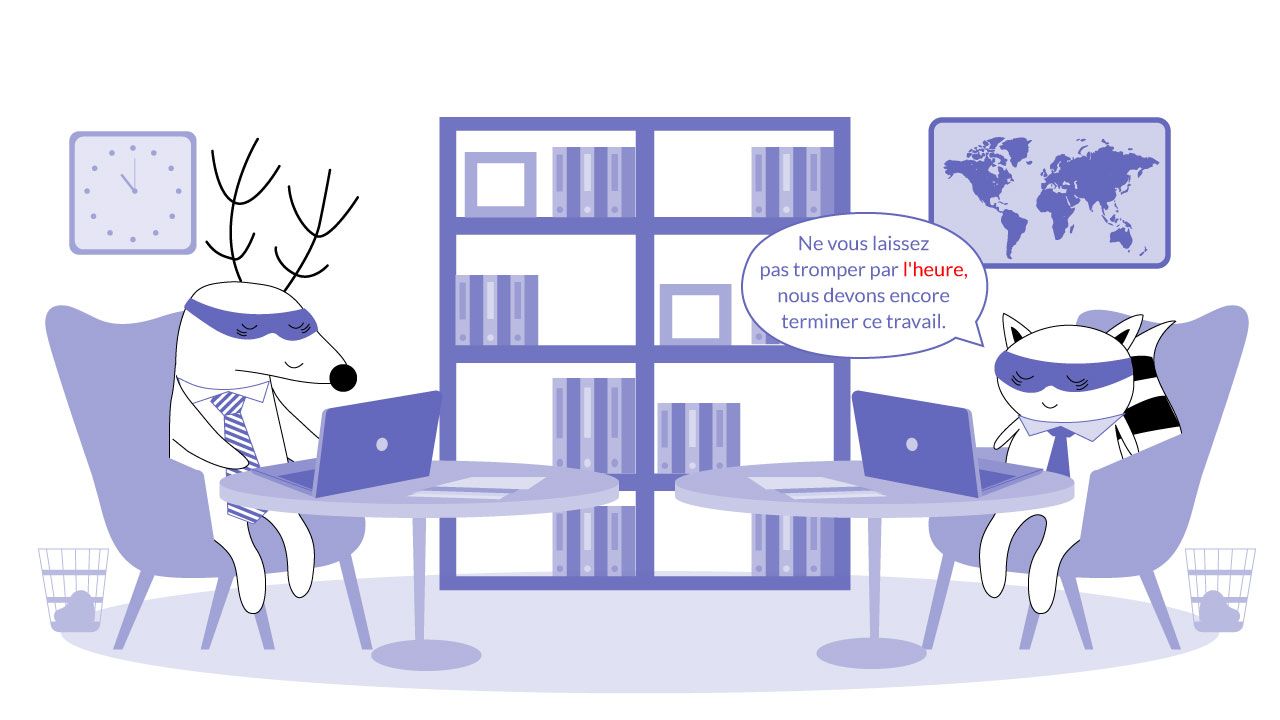
Sur / Sur / Sûr
All these words sound exactly the same, but they have different meanings and function as different parts of speech.
- As a preposition, sur means "on." You can use it in sentences like:
French
English
Pose ce livre sur la table.
Place this book on the table.
- Sur as an adjective would simply be the translation of the English “sour.” Here’s what it looks like in a sentence:
French
English
Ce jus de fruit est un peu sur.
This juice is a bit sour.
- The third word, sûr, is an adverb that means "sure" or "certain." You would use it in sentences like:
French
English
Je suis sûre que tu vas réussir.
I'm sure you'll succeed.
Vain / Le vin / Vingt / Le vent / Vins / Vint / Vend / Vends
This is a longer list, but it's still manageable. You'll notice that some of these words are very similar to each other, while others might not seem related at all. After all, the last four of them are simply different verb forms.
But let’s start from the very beginning.
- Vain is a French preposition that means “empty” or “superficial.” You might hear it in sentences like:
French
English
Ce sont de vains mots.
Those are empty words.
- Le vin – "wine." This is a word you will hear everywhere in France – when ordering wine in a restaurant or talking about someone's evening. Here's that in a sentence:
French
English
Je passe la plupart de mes soirées à lire et à siroter du vin.
I spend most evenings reading and sipping wine.
- Vingt – "twenty." This word is used just like any other number in French. Here’s an example:
French
English
Il est déjà vingt heures.
It's already eight o'clock.
- Le vent – "the wind." Like many other words on this list, le vent can be used in many different contexts. For example:
French
English
Le vent est très fort aujourd'hui.
The wind is very strong today.
- Both vins and vint are the passé simple conjugations of the verb venir (to come). Vins is used for the first and second person singular, and vint – for the third person singular. Need to see that in a sentence? Here you go:
French
English
Il vint tard ce soir-là.
He came late that night.
- On the other hand, vend and vends are the present simple conjugations of the verb vender (to sell). Vends is used for the first and second person singular, and vend – for the third person singular. Here’s what that looks like:
French
English
Que vends-tu ici ?
What do you sell here?
Final Notes on Learning French Homophones
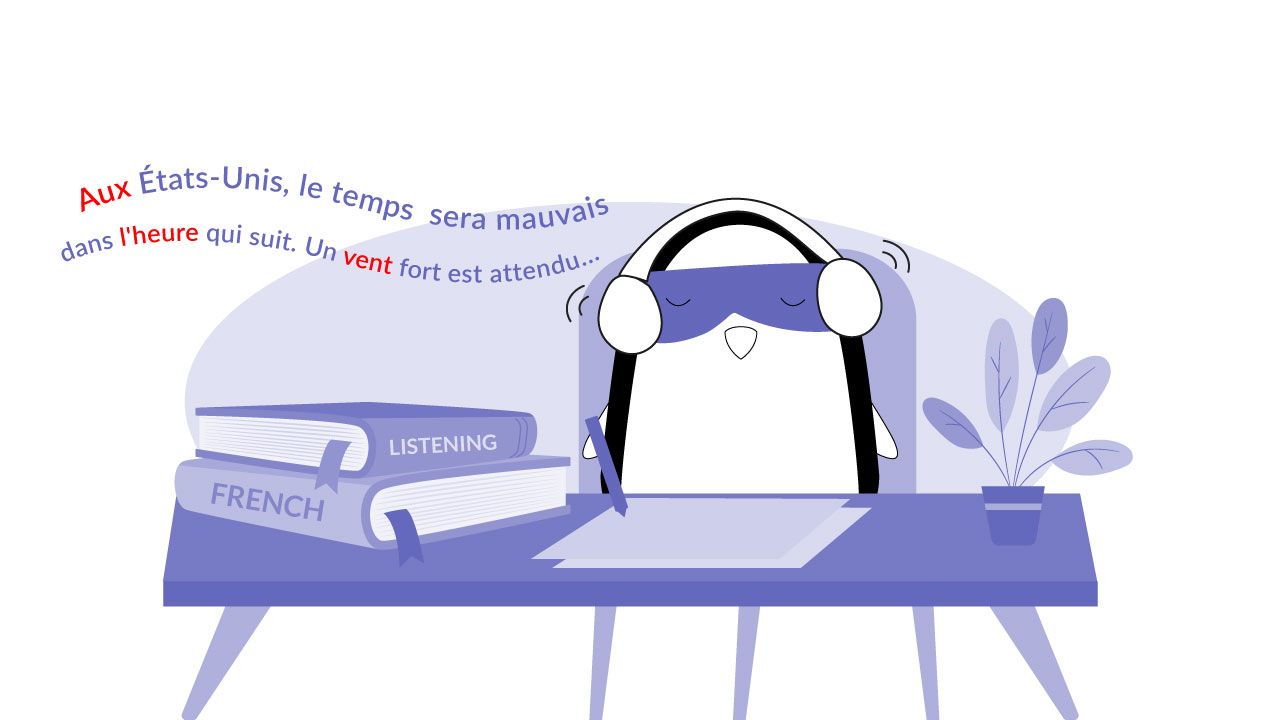
Distinguishing between homophones can present a bit of a challenge for many language learners. To make sure you avoid troubles with that, we recommend working on your listening comprehension regularly – practice a lot, make flashcards, and with time, this will get easier.
Of course, you can still encounter issues with the French words that sound the same. French pronunciation can have similar pronunciation for 6 different words, which can even be hard for the native speakers.
In case you encounter a phrase where you can’t distinguish between “tower” (le tour) and “tour” (le tour as well), try to figure it out from the context. Is there a tower nearby? Is the tour starting? In case when the context is not clear – like you are looking at the tower during the tour – don’t hesitate to ask questions. After all, asking for explanations is the best way to learn.
In the long run, French homophones are fun – so use them. Practice. Don’t be afraid to make mistakes. Even if at some point, you use the wrong homophone, it will just become a subject for a good laugh, just like it happens in your native language. So just enjoy the journey – and speak up.








